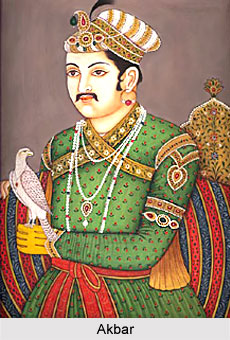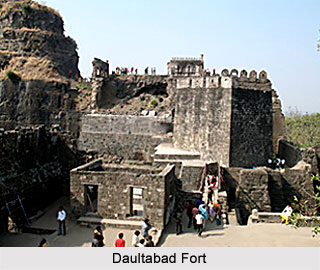 Conquest of Akbar was largely successful and his empire extended from Kabul in the west to the Bengal in the east and from Kashmir in the north to the Vindhyas in the south. Akbar was an imperialist. He frankly declared and desired to pursue the policy of the extension of the empire. Akbar engaged himself in wars of conquest all through his life. He initiated his conquest of southern India and partially succeeded before he died. He conquered the entire north India and consolidated it, under his administration.
Conquest of Akbar was largely successful and his empire extended from Kabul in the west to the Bengal in the east and from Kashmir in the north to the Vindhyas in the south. Akbar was an imperialist. He frankly declared and desired to pursue the policy of the extension of the empire. Akbar engaged himself in wars of conquest all through his life. He initiated his conquest of southern India and partially succeeded before he died. He conquered the entire north India and consolidated it, under his administration.
The first conquest of Akbar was that of Malwa. The ruler of Malwa was neglectful towards the affairs of the state and kept himself engrossed in dance and music. Akbar dispatched Adham Khan to conquer Malwa and after his success was made the governor. In 1562 A.D., Pir Muhammad was appointed the governor of Malwa. Baz Bahadur took a few rulers of southern India and attacked Malwa but his success remained short-lived. Akbar sent Abdullah Khan of Uzbeg to recapture Malwa and eventually Baz Bahadur accepted the suzerainty of Akbar. Akbar was successful in capturing the fort of Chunargarh in 1561 A.D.
It was part of the imperial policy of Akbar to bring Rajasthan to submission. Akbar pursued a different policy of annexation towards the Rajput rulers. He captured all important forts in Rajasthan and accepted the services of all those Rajput rulers who surrendered to him voluntarily. He fought aggressive wars against those rulers who refused to submit to him voluntarily and annexed their territories. Akbar succeeded in getting submission of all Rajput rulers of Rajasthan and thus largely succeeded in getting submission of Rajasthan. Gujarat was a prosperous province. It was regarded as the centre place of the trade with the western world. Akbar attacked Gujarat in person in 1572 A.D. He did not face any serious challenge and Ahmedabad was occupied by the Mughals after a minor battle. Akbar occupied territory as far as Cambay and occupied the fort of Surat. That completed the conquest of Gujarat.
 Akbar attacked Bihar in 1574 A.D. and occupied it. Bengal was annexed to the Mughal Empire in July 1576 A.D. Akbar appointed Abdur Rahim as governor of Multan and assigned him the responsibility to conquer Sind. Abdur Rahim attacked Sindh in1591 A.D. and defeated Mini Beg, the ruler of Sind in two battles and Sindh was annexed to the Mughal Empire. Nisar Khan was the ruler of Orissa when Raja Man Singh, governor of Bihar attacked Orissa in 1590 A.D. Nisar Khan surrendered to the Mughals after a feeble resistance. He was deputed as the governor of Orissa. But, after two years he rebelled and even occupied Puri and Jagannath. Raja Man Singh defeated and forced him to leave Orissa which was, then annexed to the Mughal Empire in 1592 A.D. Akbar dispatched Mir Masum to conquer Baluchistan in 1595 A.D. Mir Masum succeeded in his mission, defeated the Baluchi chiefs and annexed entire Baluchistan to the Mughal empire.
Akbar attacked Bihar in 1574 A.D. and occupied it. Bengal was annexed to the Mughal Empire in July 1576 A.D. Akbar appointed Abdur Rahim as governor of Multan and assigned him the responsibility to conquer Sind. Abdur Rahim attacked Sindh in1591 A.D. and defeated Mini Beg, the ruler of Sind in two battles and Sindh was annexed to the Mughal Empire. Nisar Khan was the ruler of Orissa when Raja Man Singh, governor of Bihar attacked Orissa in 1590 A.D. Nisar Khan surrendered to the Mughals after a feeble resistance. He was deputed as the governor of Orissa. But, after two years he rebelled and even occupied Puri and Jagannath. Raja Man Singh defeated and forced him to leave Orissa which was, then annexed to the Mughal Empire in 1592 A.D. Akbar dispatched Mir Masum to conquer Baluchistan in 1595 A.D. Mir Masum succeeded in his mission, defeated the Baluchi chiefs and annexed entire Baluchistan to the Mughal empire.
Akbar desired to bring south India under his suzerainty and, accordingly, sent messages to the rulers of Khandesh, Ahmednagar, Bijapur and Golconda in 1591 A.D. Ali Khan, ruler of Khandesh alone accepted the offer of the Mughal emperor, accepted his suzerainty and agreed to pay an annual tribute. The rulers of the other states however, refused to accept the offer of Akbar. Akbar deputed prince Murad and Abdur Rahim to conquer Ahmednagar. The Mughals occupied Daultabad in 1599 A.D. and Ahmednagar in 1600 A.D. Khandesh also tried to reassert its independence. Raja Ali Khan the ruler of Khandesh died fighting against Ahmednagar from the side of the Mughals. He was succeeded by his son Miran Bahadur Shah. He refused to acknowledge the suzerainty of Akbar at the time when the Mughals were engaged with Ahmednagar. Akbar attacked Burhanpur, the capital of Khandesh in 1599 A.D. and occupied it.
Thus, by 1600 A.D., Akbar captured Khandesh, Berar, and part of Ahmednagar and forts of Burhanpur, Asirgarh, Daultabad and Ahmednagar. Akbar, thus, captured the whole of north India and provided sound stability. A part of the Deccan was also conquered by him The Mughal empire extended from Kandhar and Kabul in the west to Bengal in the east and from Kashmir in the north to Berar and Ahmednagar in the south during his time and became the most extensive and powerful empire in India. The power of the Afghans was completely broken. They lost the ambition of an independence kingdom of their own and accepted service under the Mughal emperor. Akbar thus succeeded in fulfilling his ambition of conquering India to a large extent and also paved the way to complete the conquest of the remaining part of India by his successors.






































